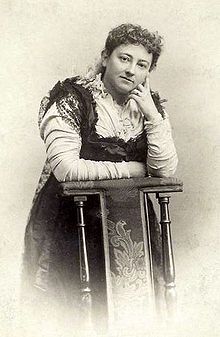Olive Schreiner
Olive Schreiner was a South African author, antiwar campaigner and intellectual. She is best remembered today for her novel The Story of an African Farm which has been highly acclaimed since its first publication in 1883 for the bold manner in which it deals with some of the burning issues of the day, including agnosticism, existential independence, individualism, the professional aspirations of women, and the elemental nature of life on the colonial frontier. In more recent studies she has also been identified as an advocate for those sidelined by the forces of British Imperialism, such as the Afrikaners, and later other South African groups like Blacks, Jews and Indians to name but a few. Although she showed interest in socialism, pacifism, vegetarianism and feminism amongst other things, her true views escape restrictive categorisations. Her published works and other surviving writings promote implicit values like moderation, friendship and understanding amongst all peoples and av
Olive Emilie Albertina Schreiner was the ninth of twelve children born to a missionary couple at the Wesleyan Missionary Society station at Wittebergen in the Eastern Cape, near Herschel in South Africa. Her parents, Gottlob Schreiner and Rebecca Lyndall, married in England in 1837. She was named after her three older brothers, Oliver , Albert and Emile , who died before she was born. Her childhood was a harsh one as her father was loving and gentle, though impractical, which led to difficulties for the family but her mother Rebecca was intent on teaching her children the same restraint and selfdiscipline that had been a part of her upbringing. Olive received virtually all of her initial education from her mother, who was wellread and gifted. Her eldest brother Frederic Samuel obtained a BA at London University and founded New College in Eastbourne in 18734. He remained as headmaster until late 1897, but continued to run the junior school until 1901. He died in 1901 at the Grand Hot
Source: Wikipedia

